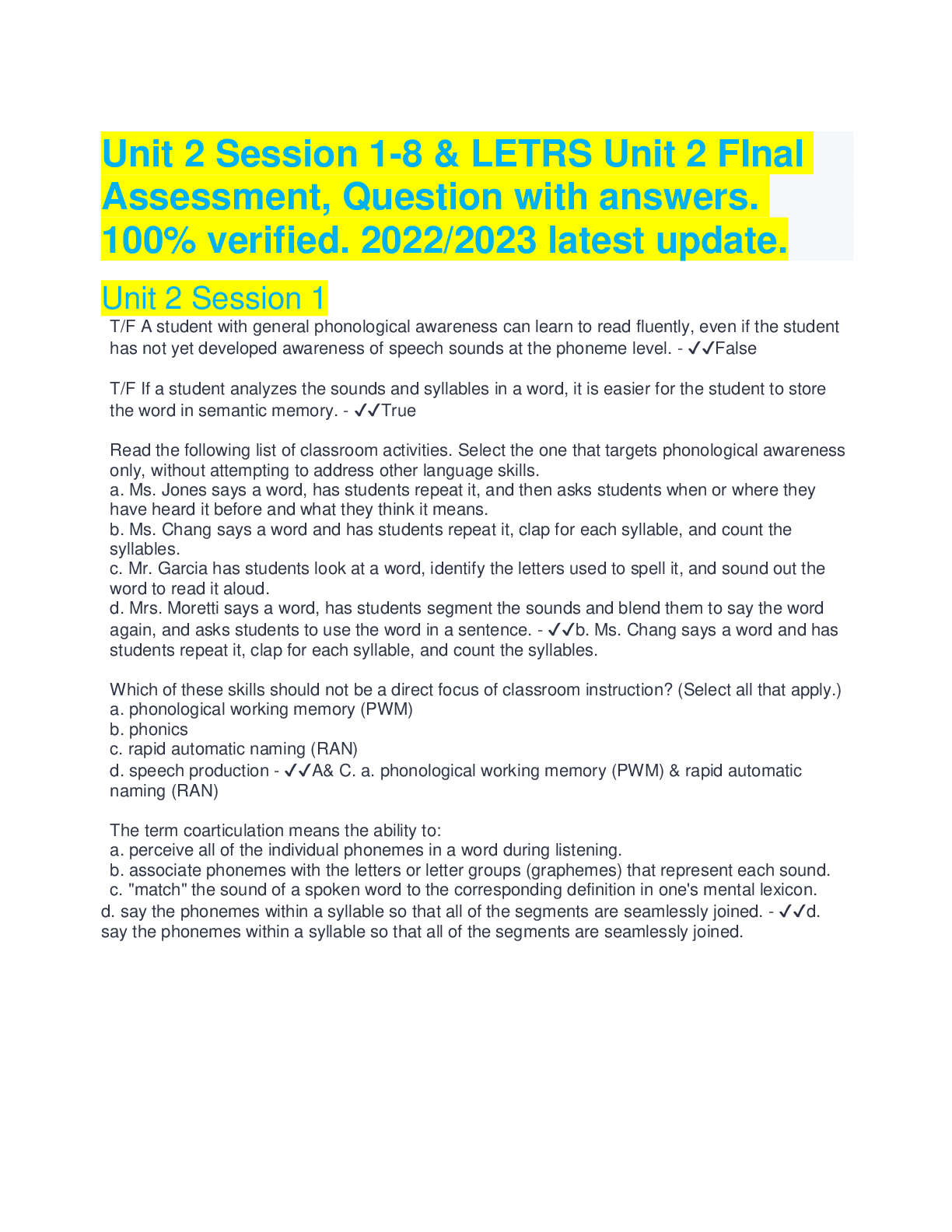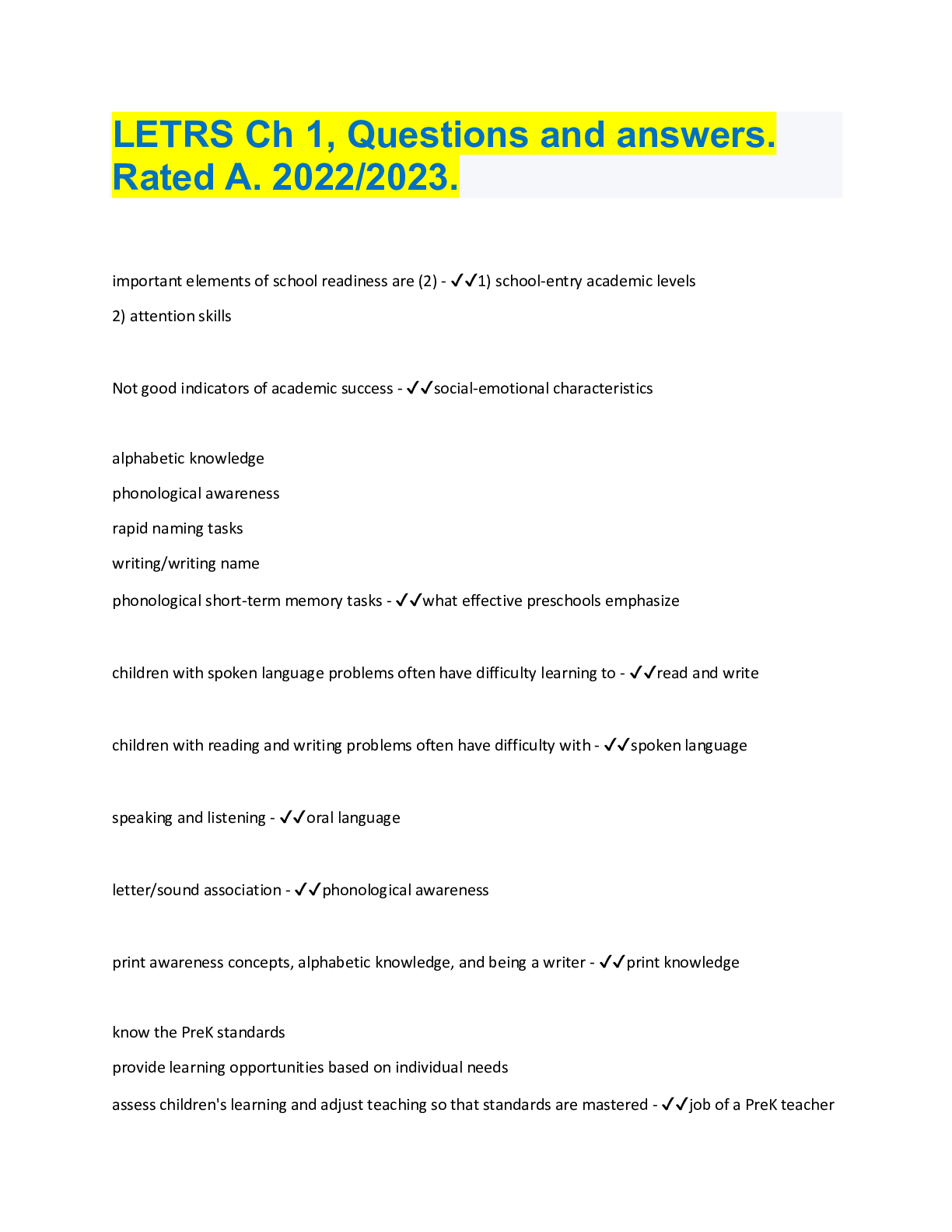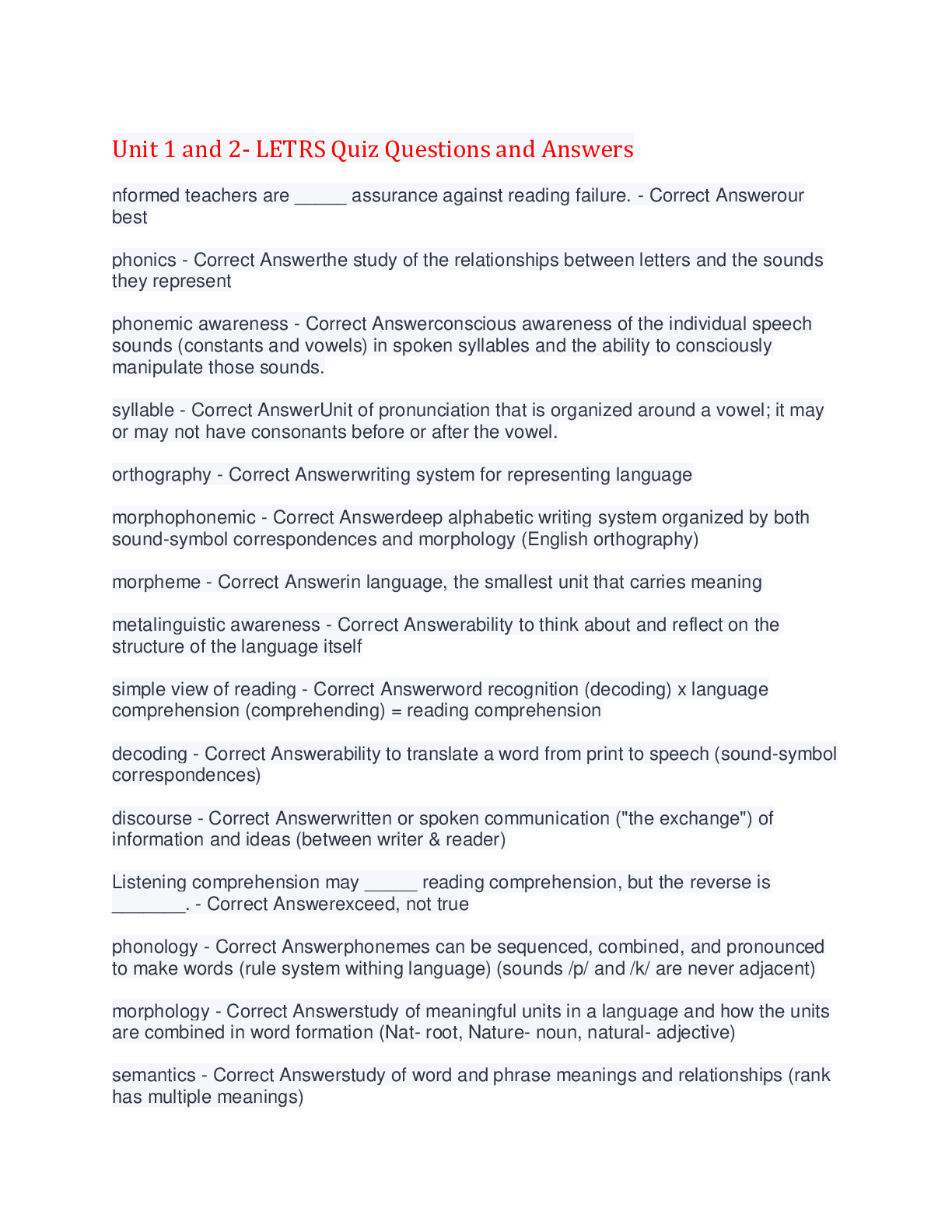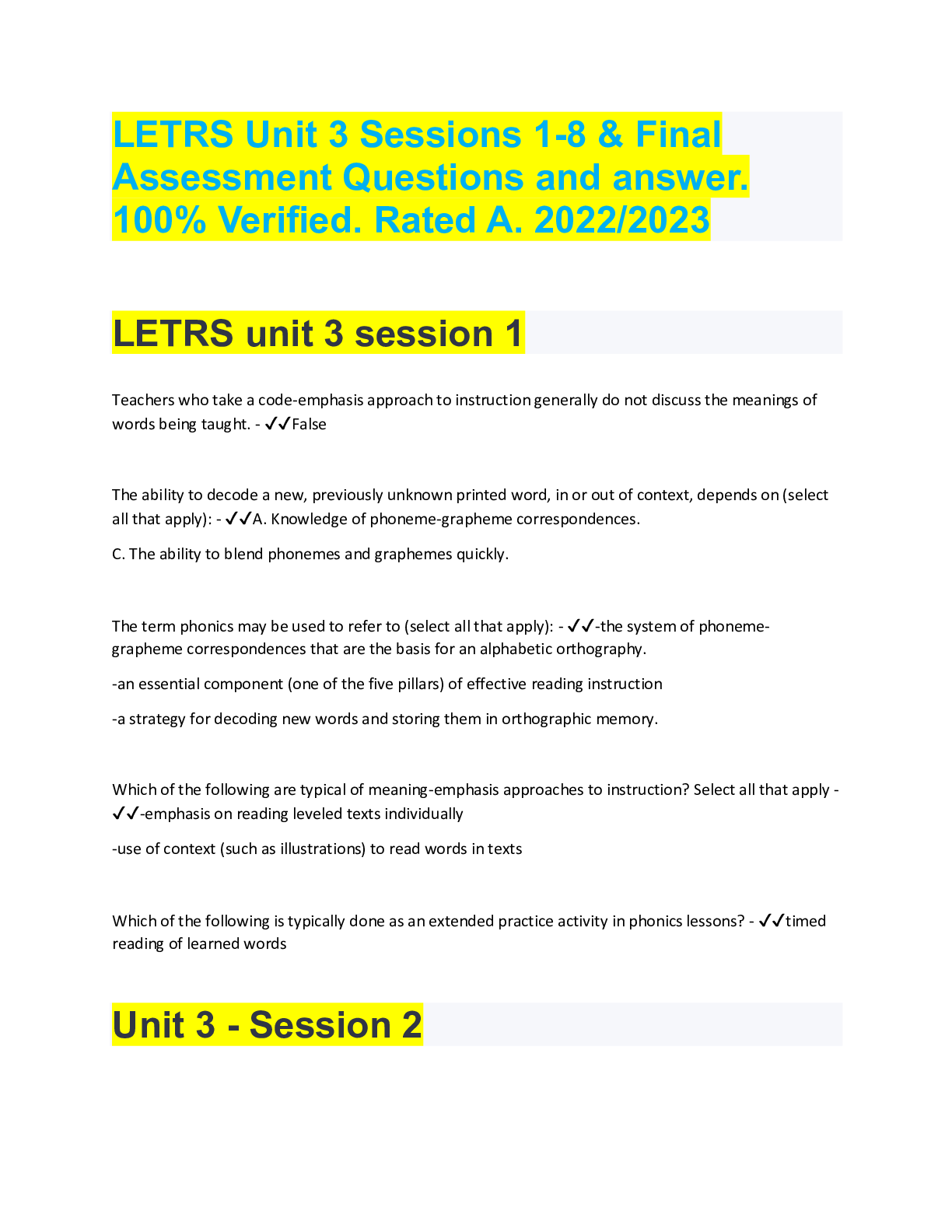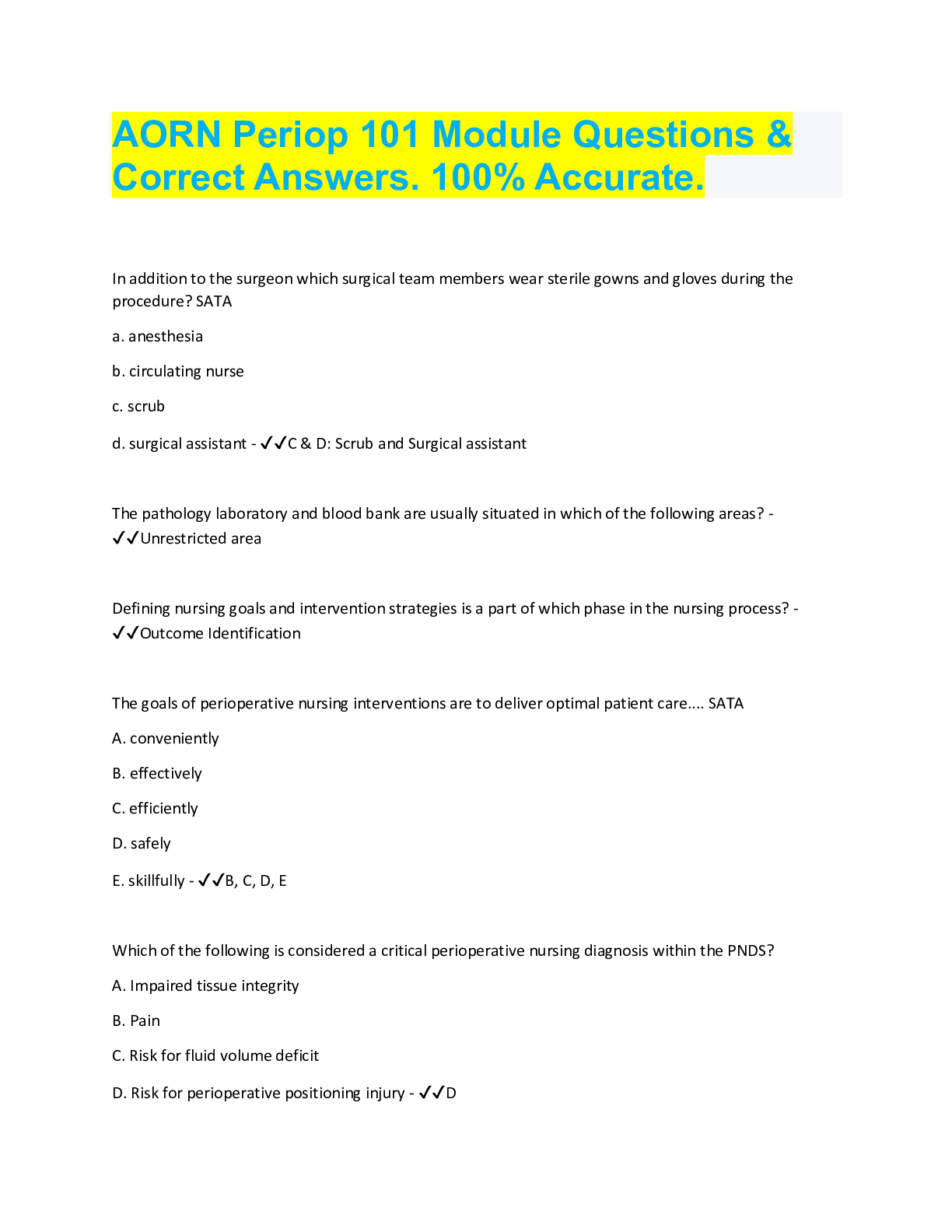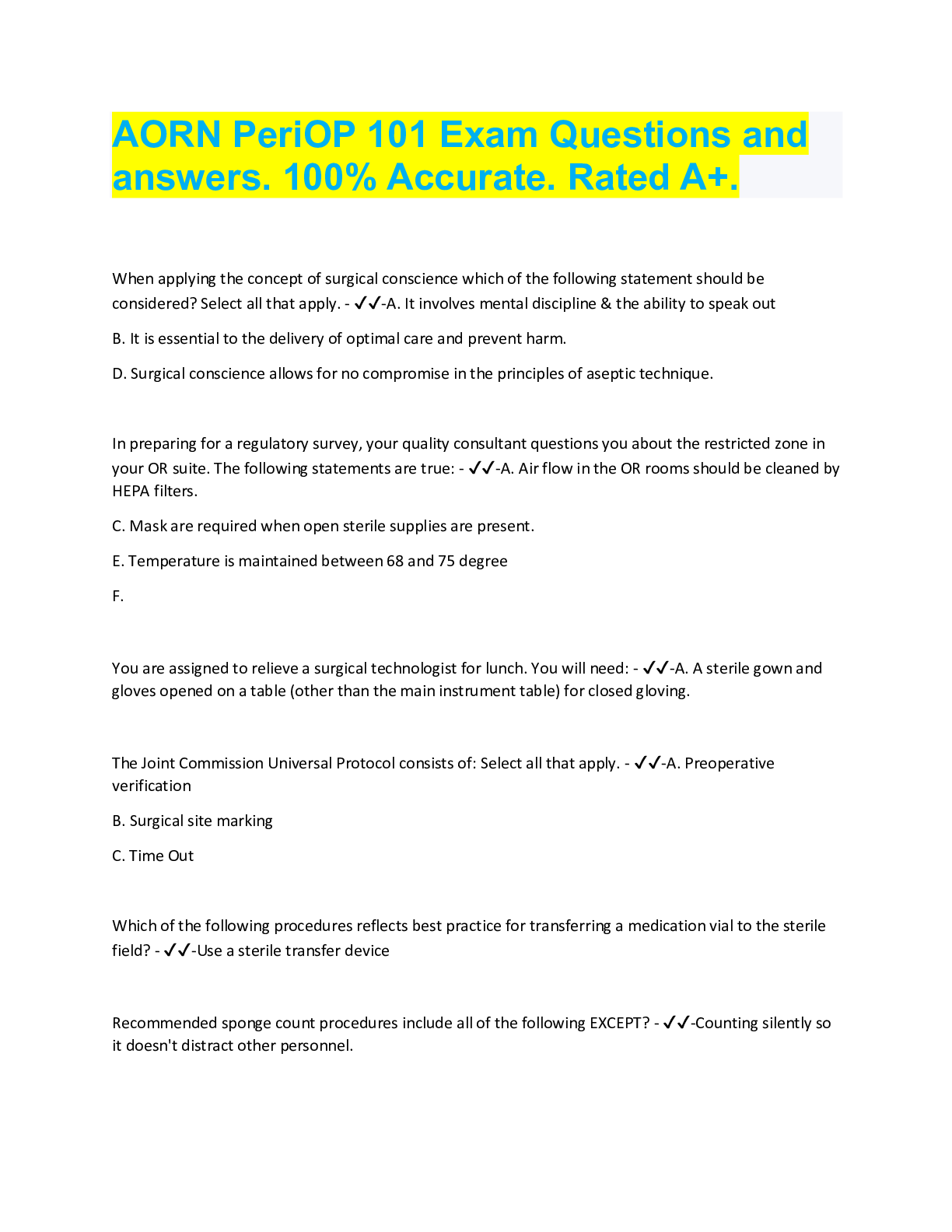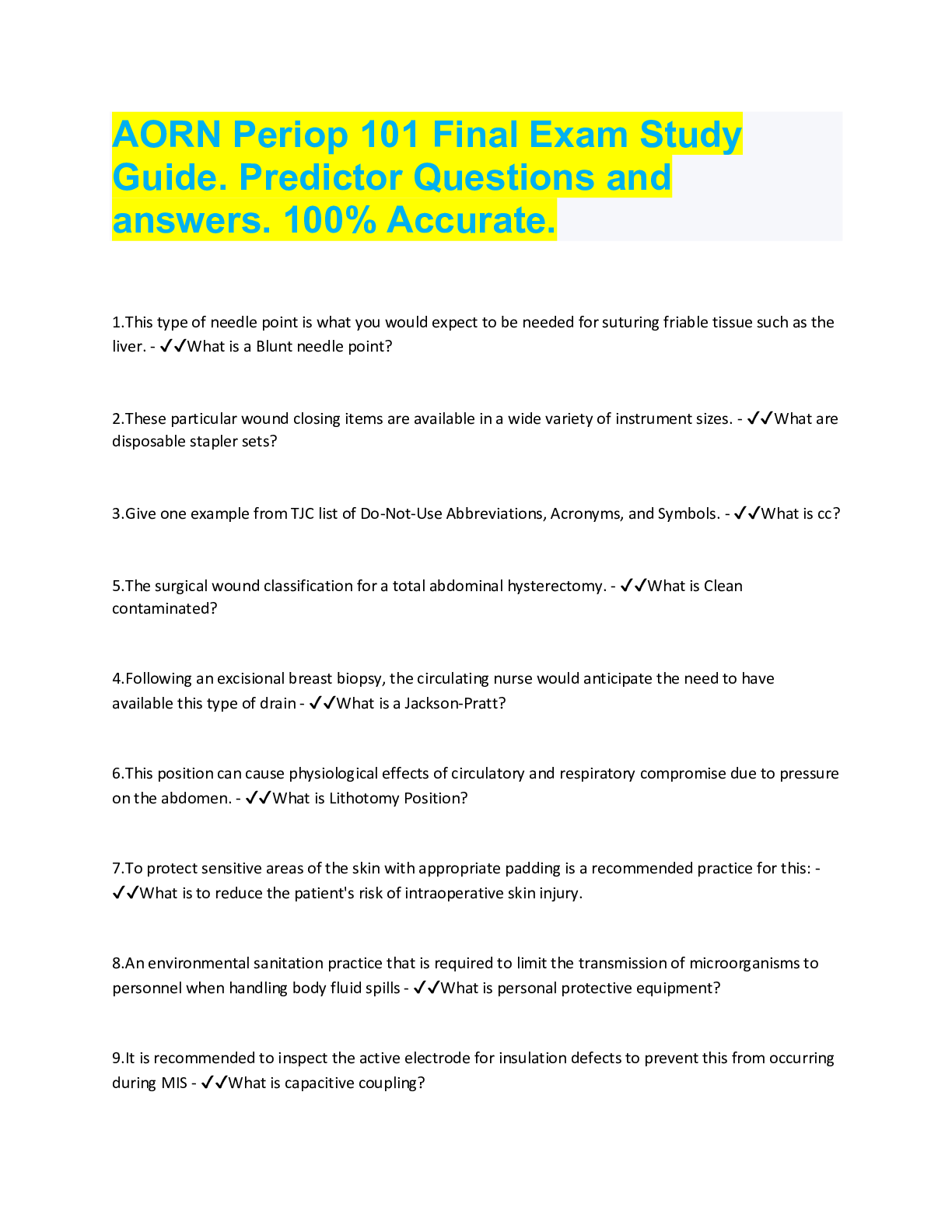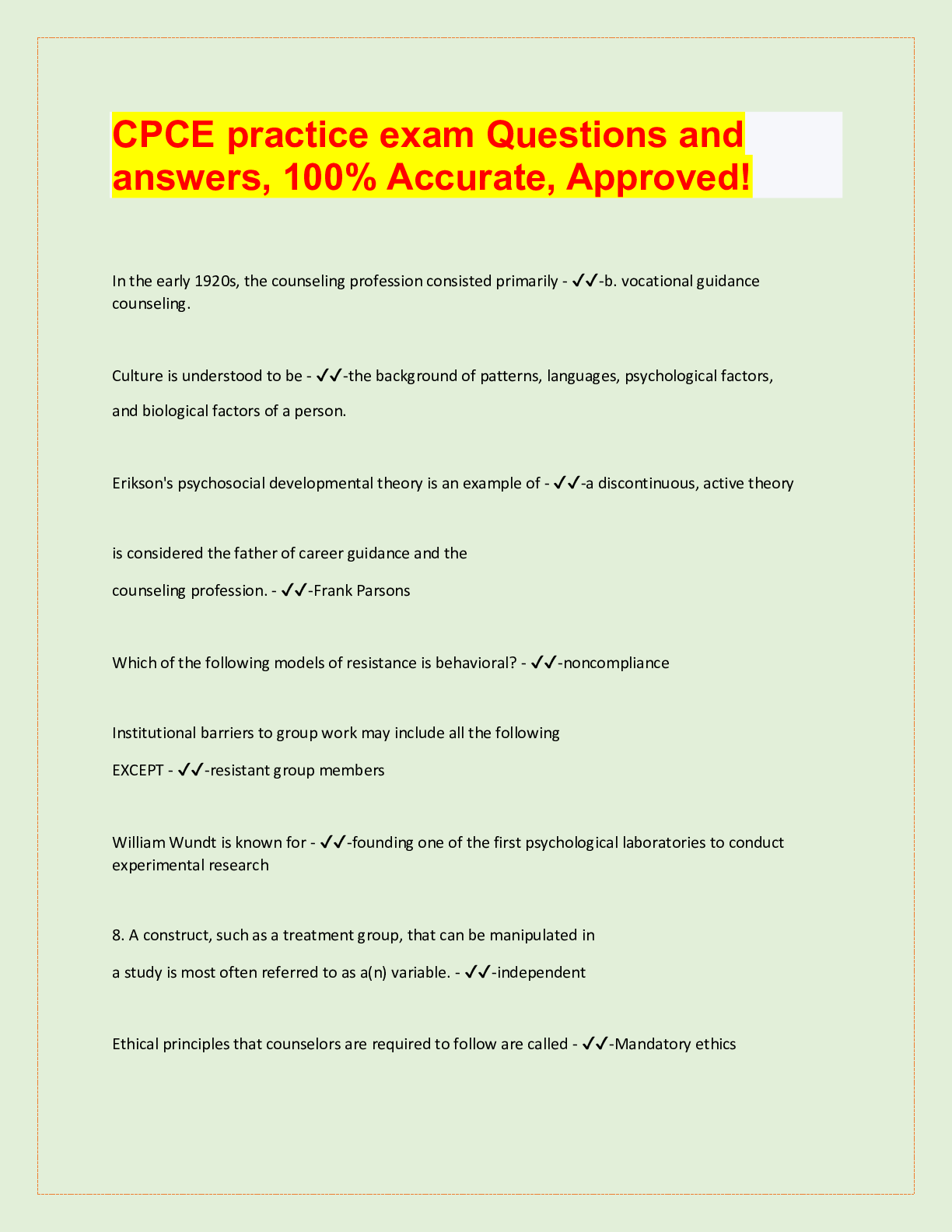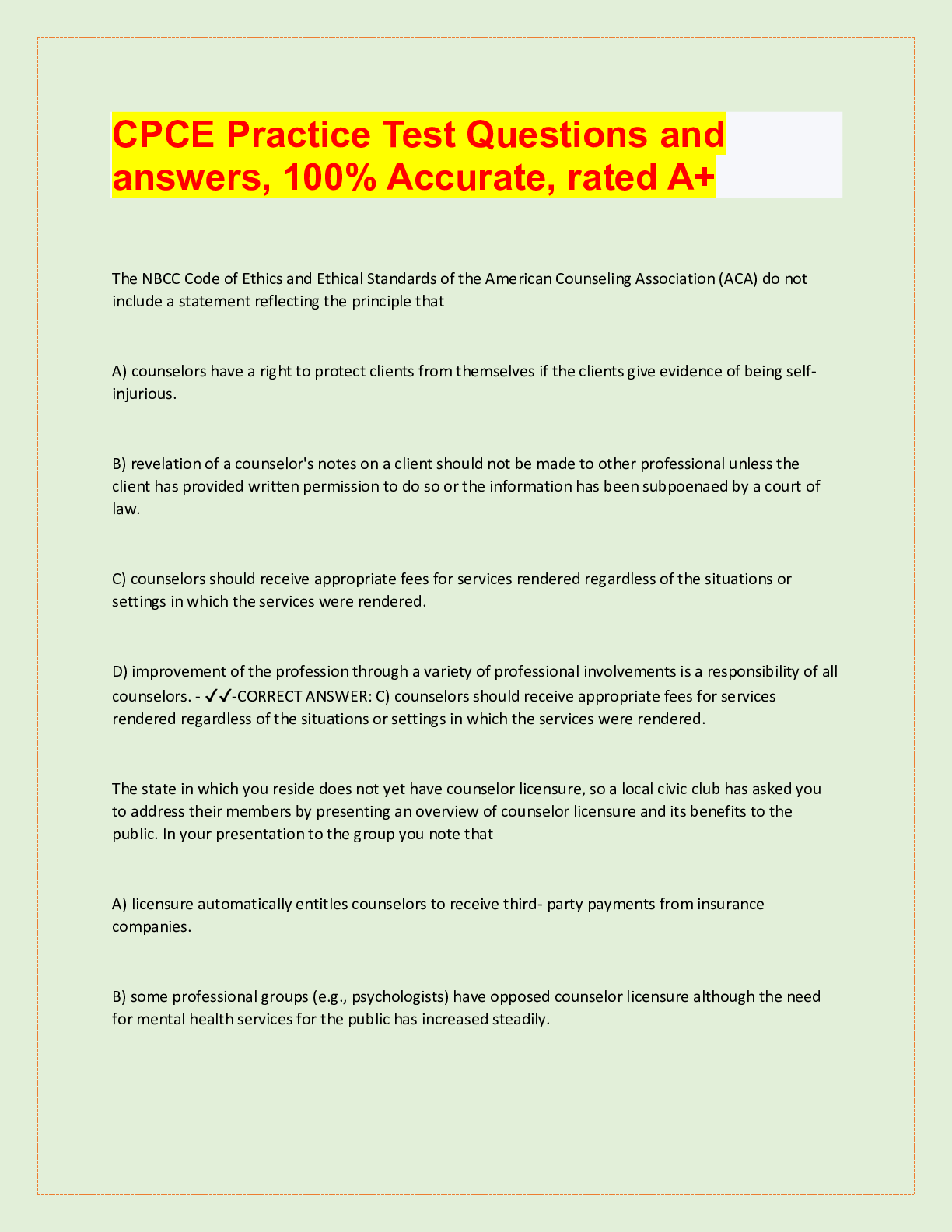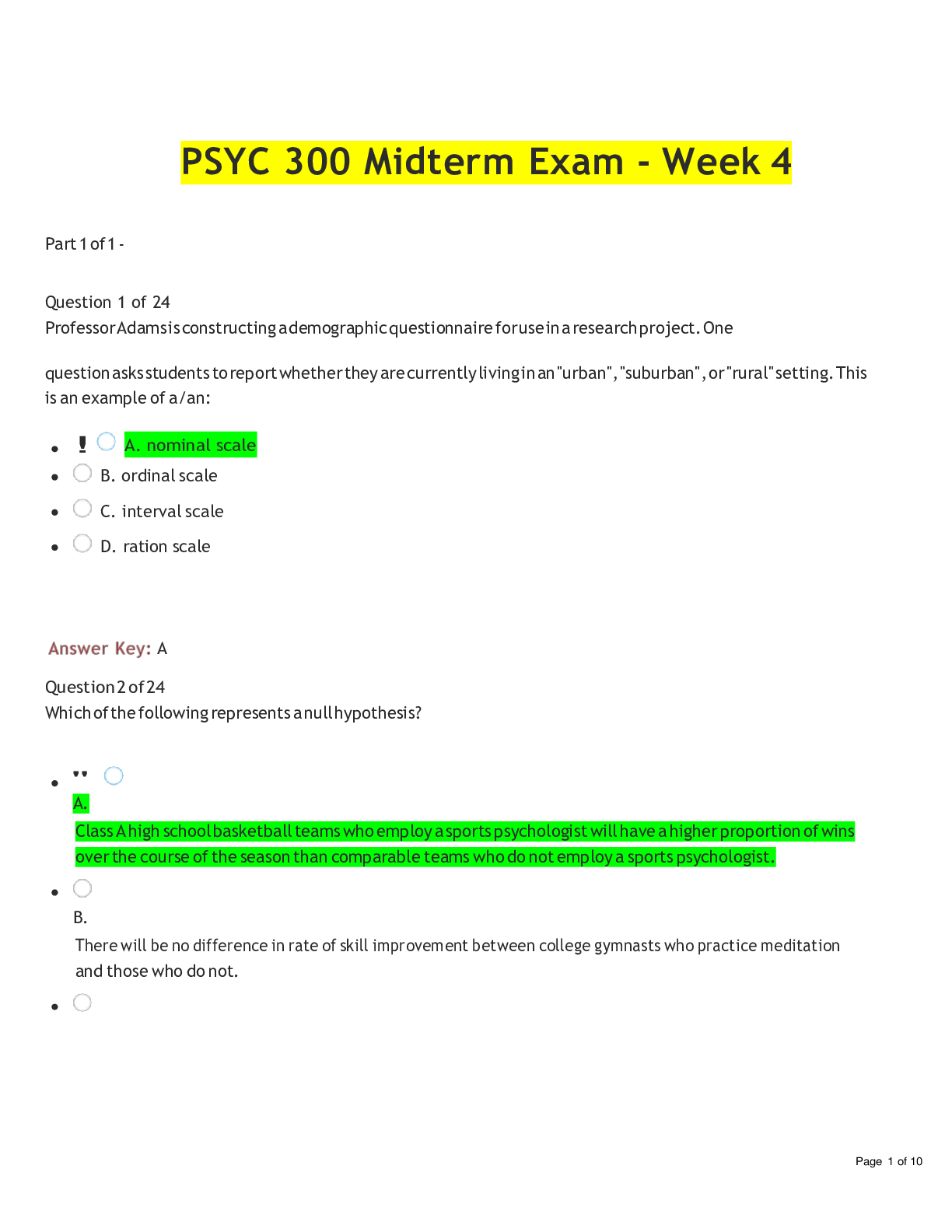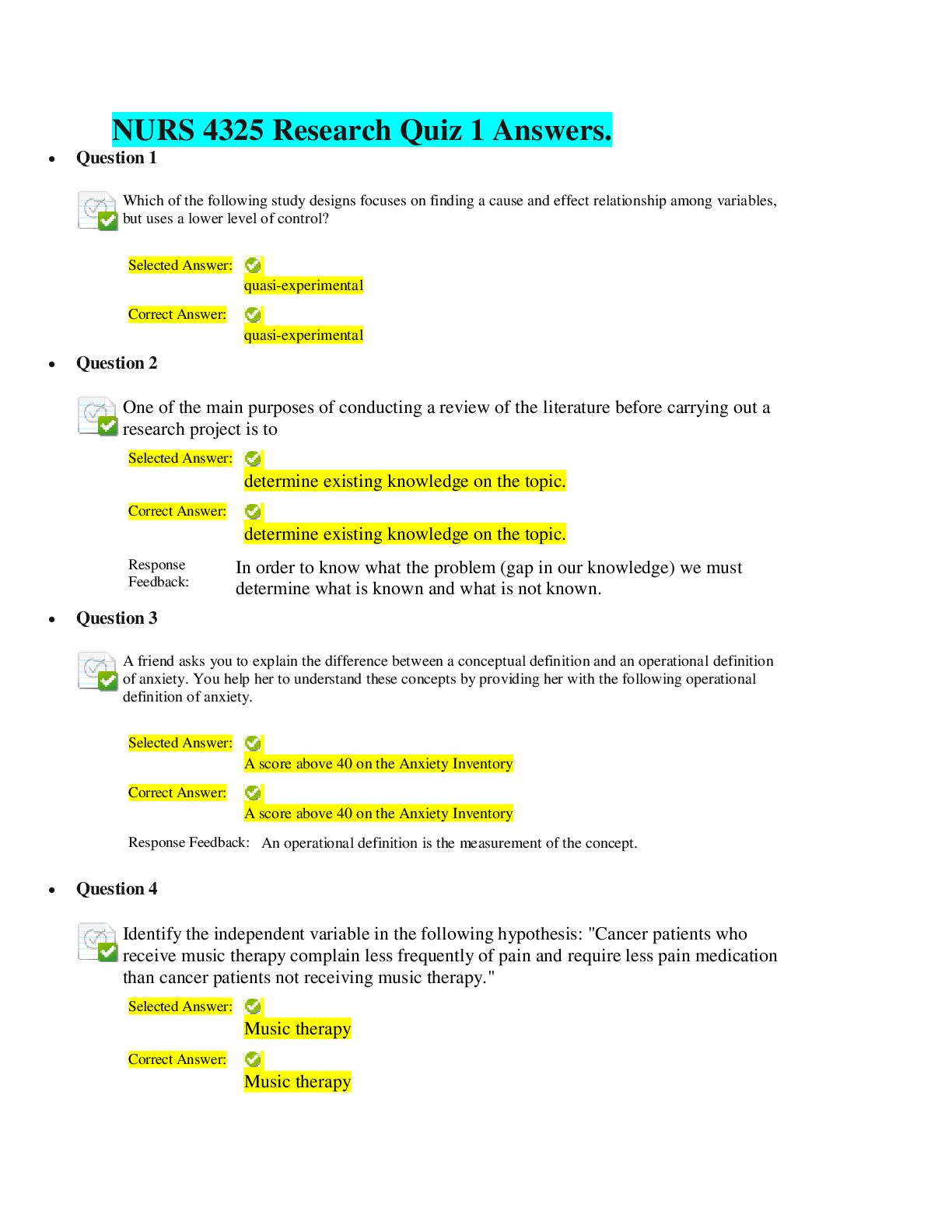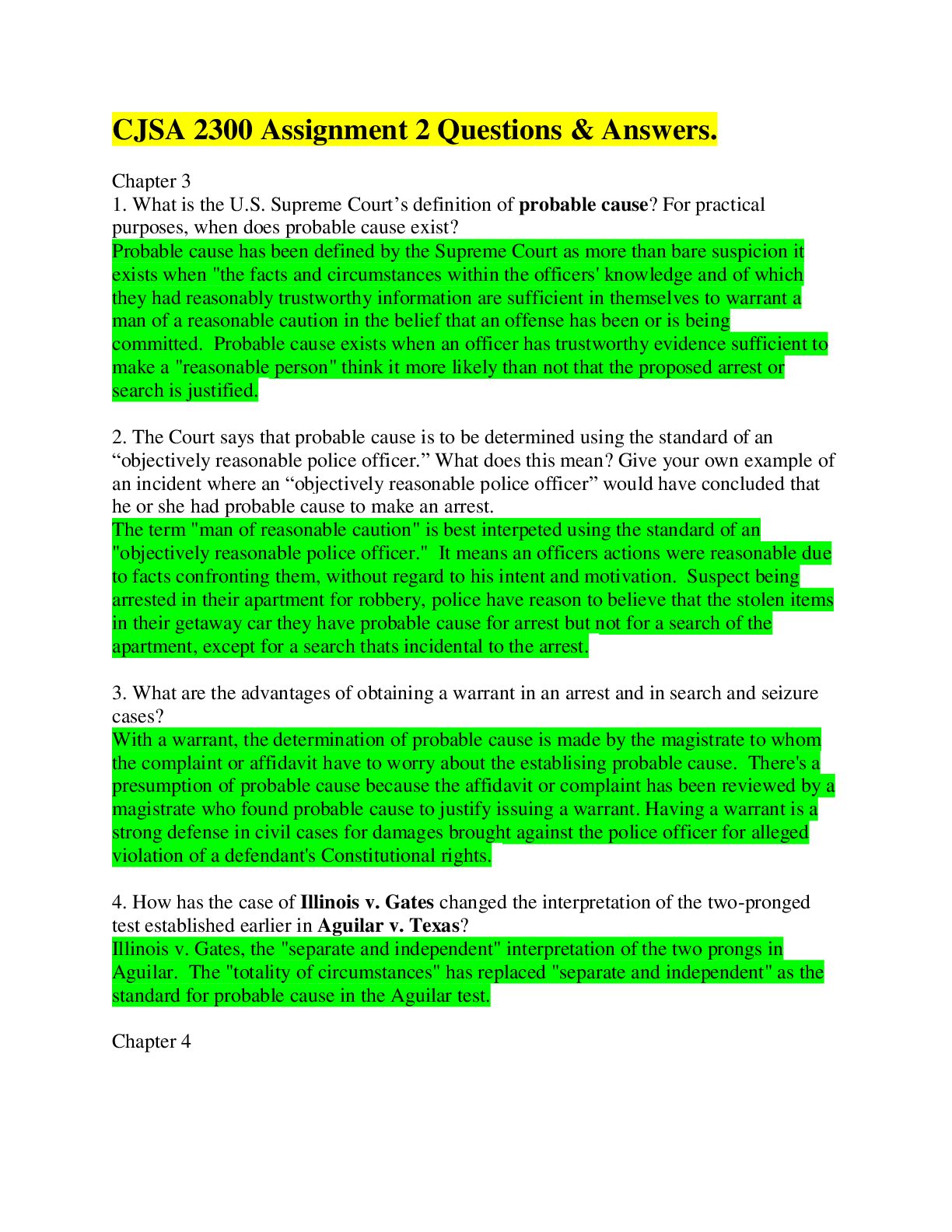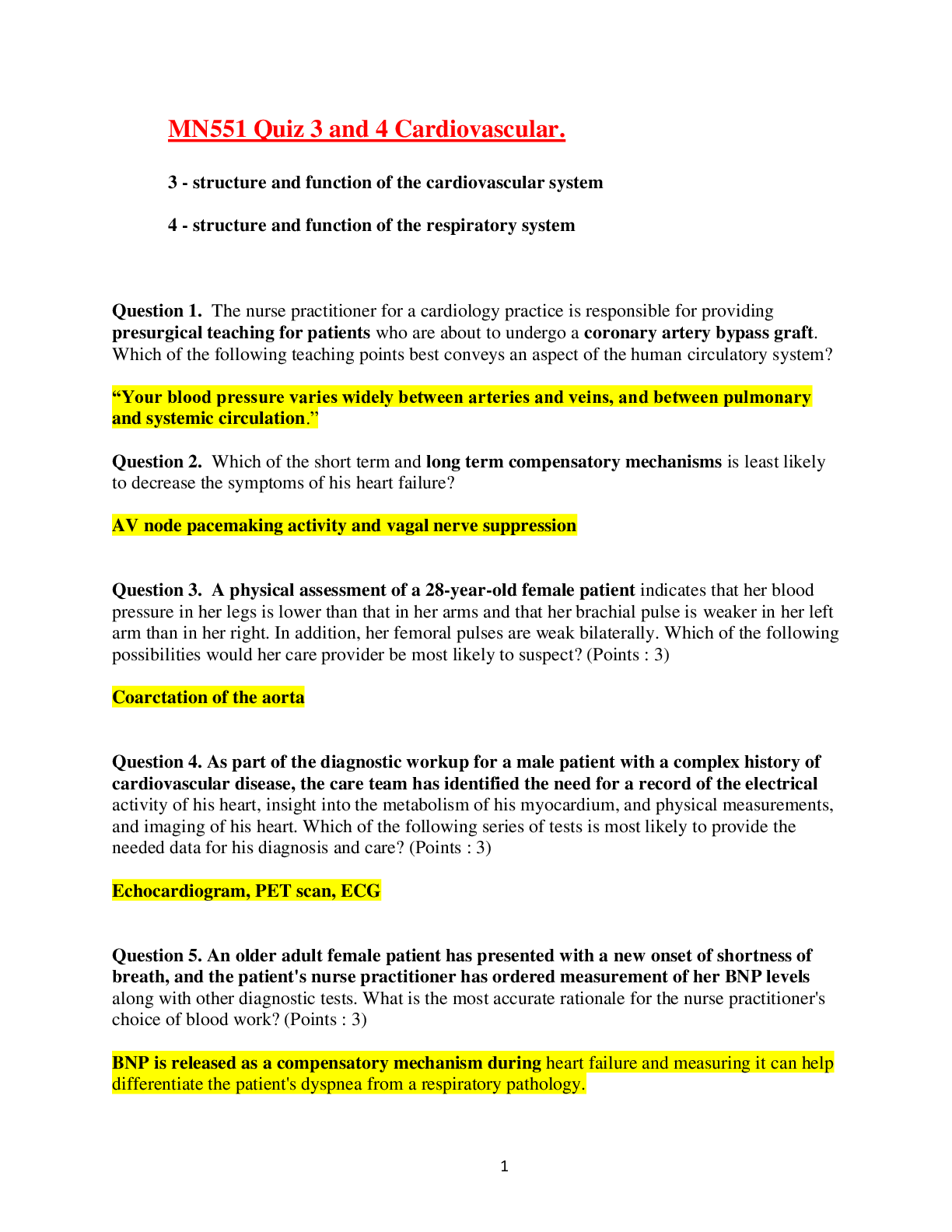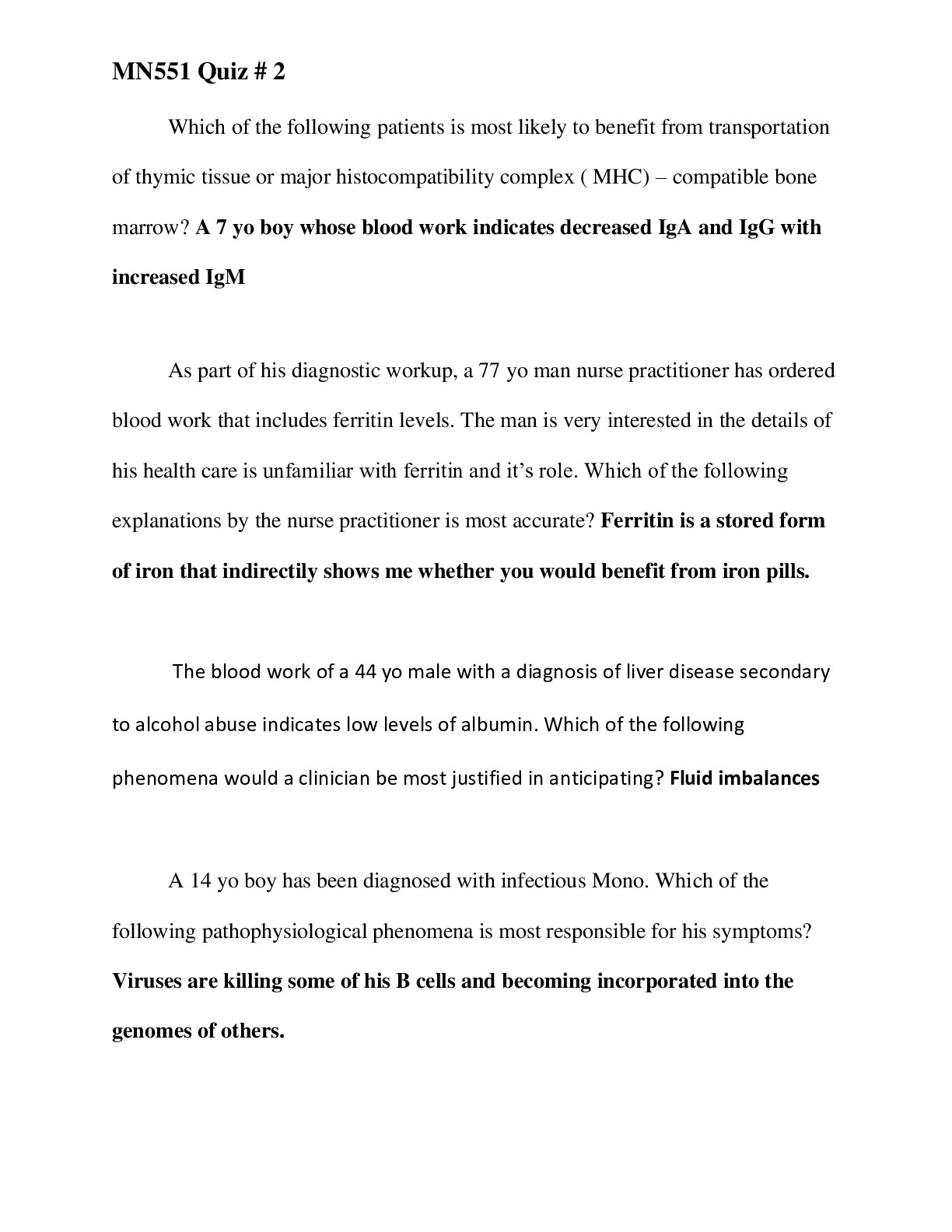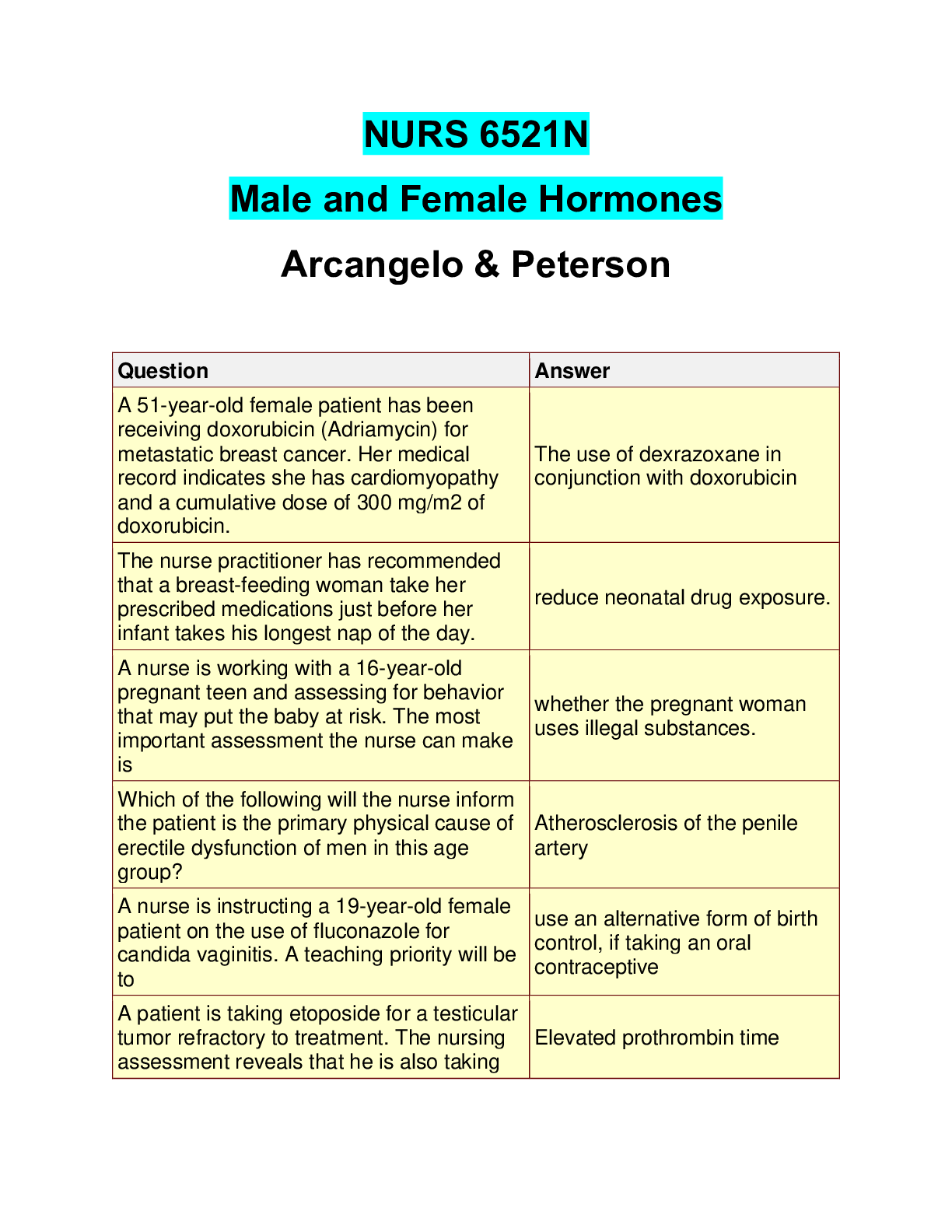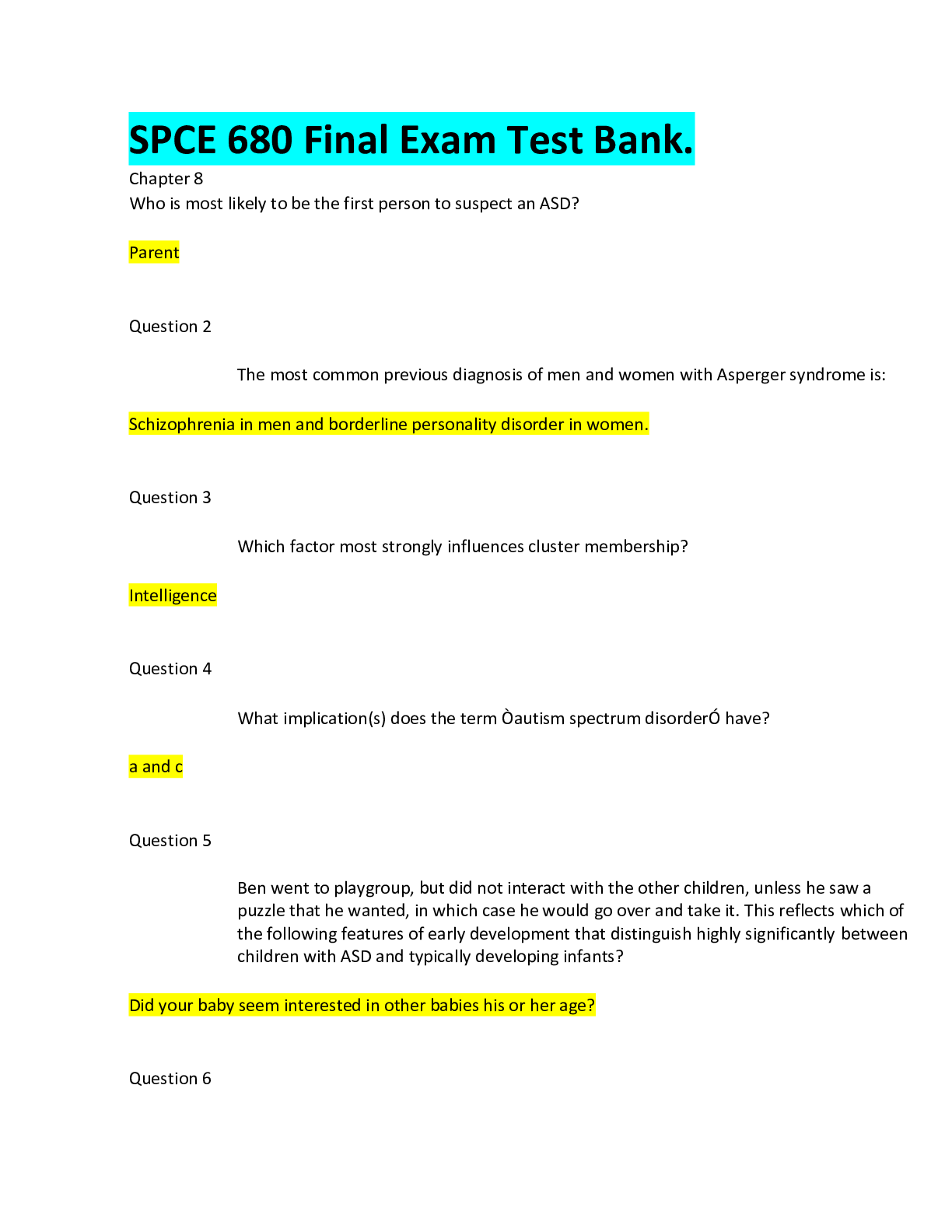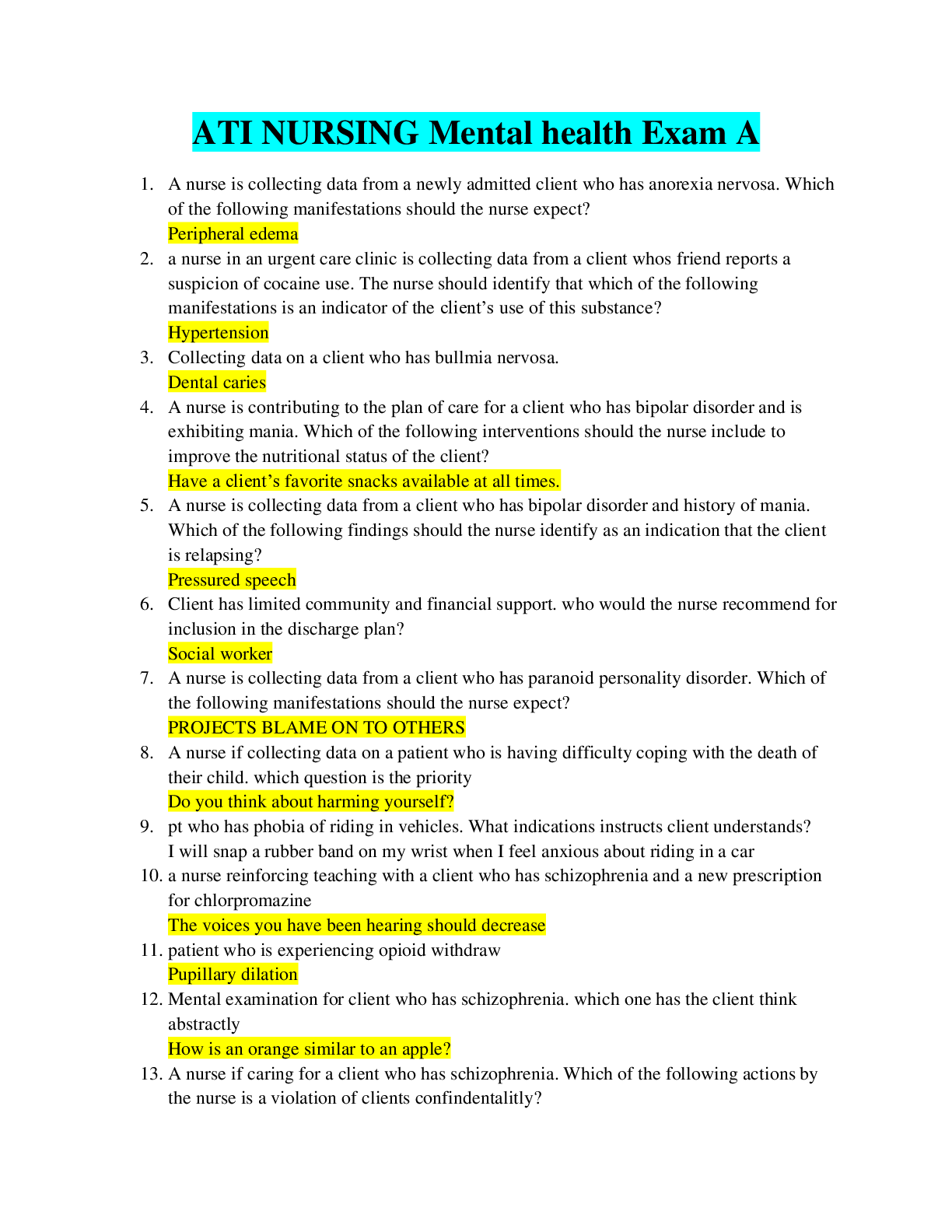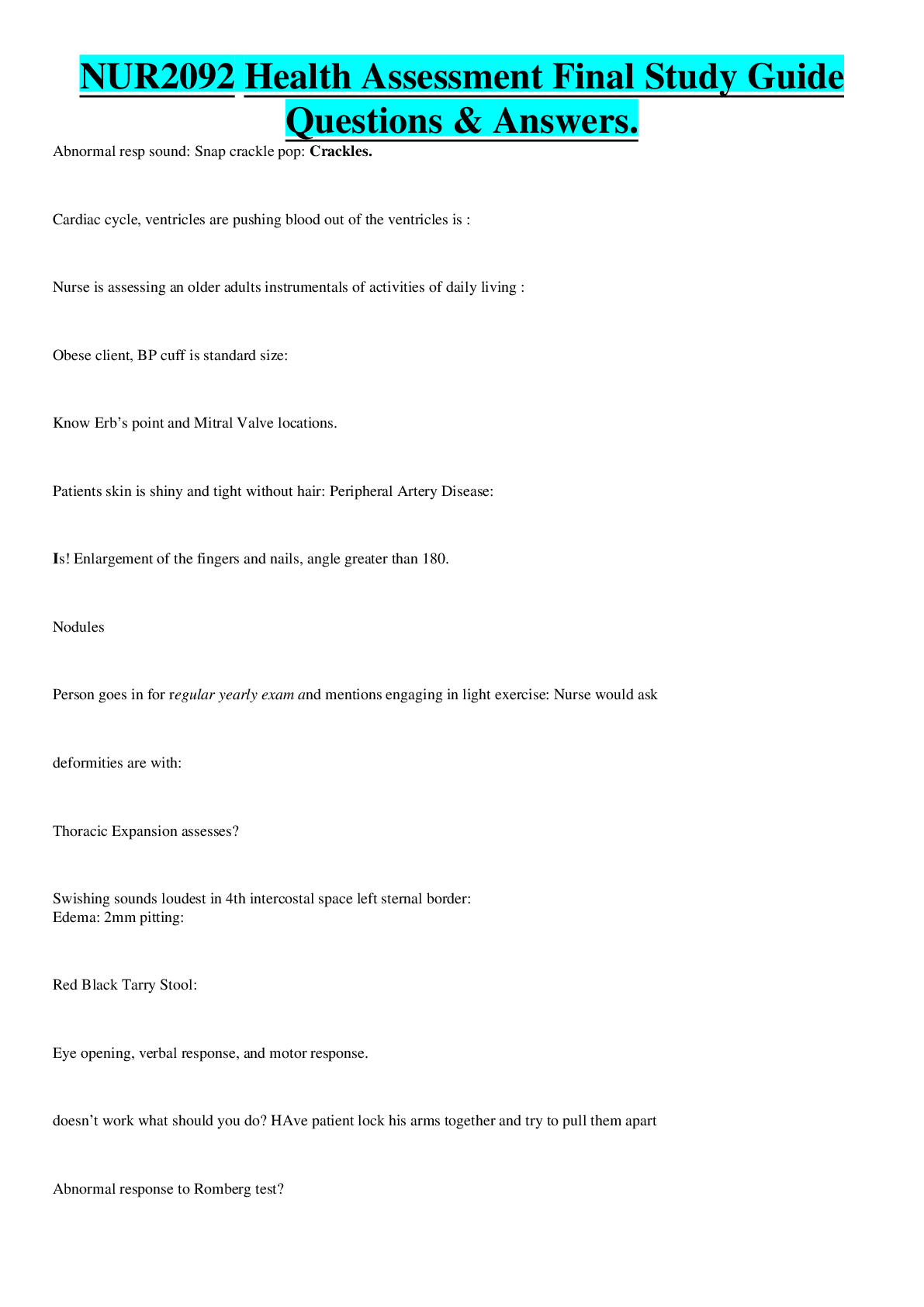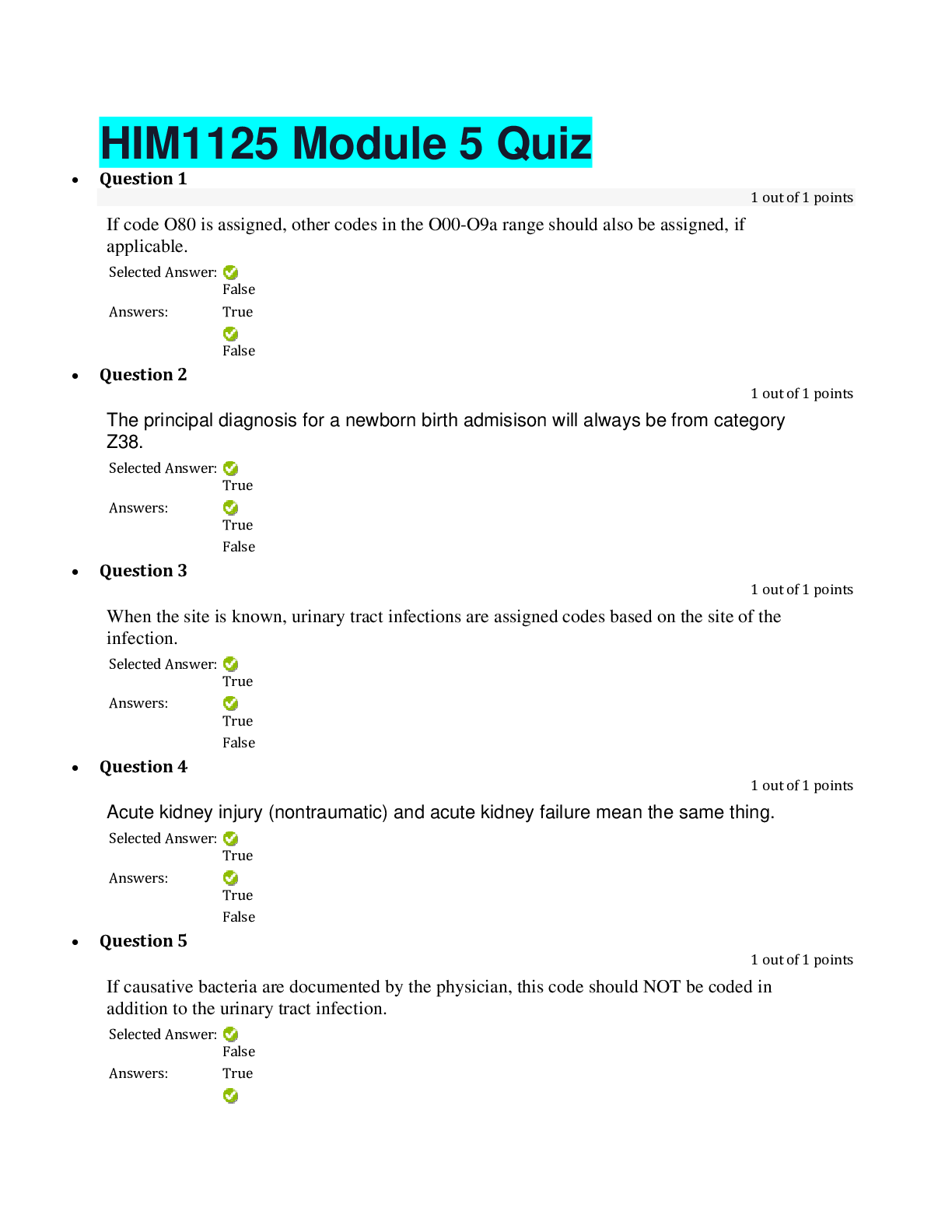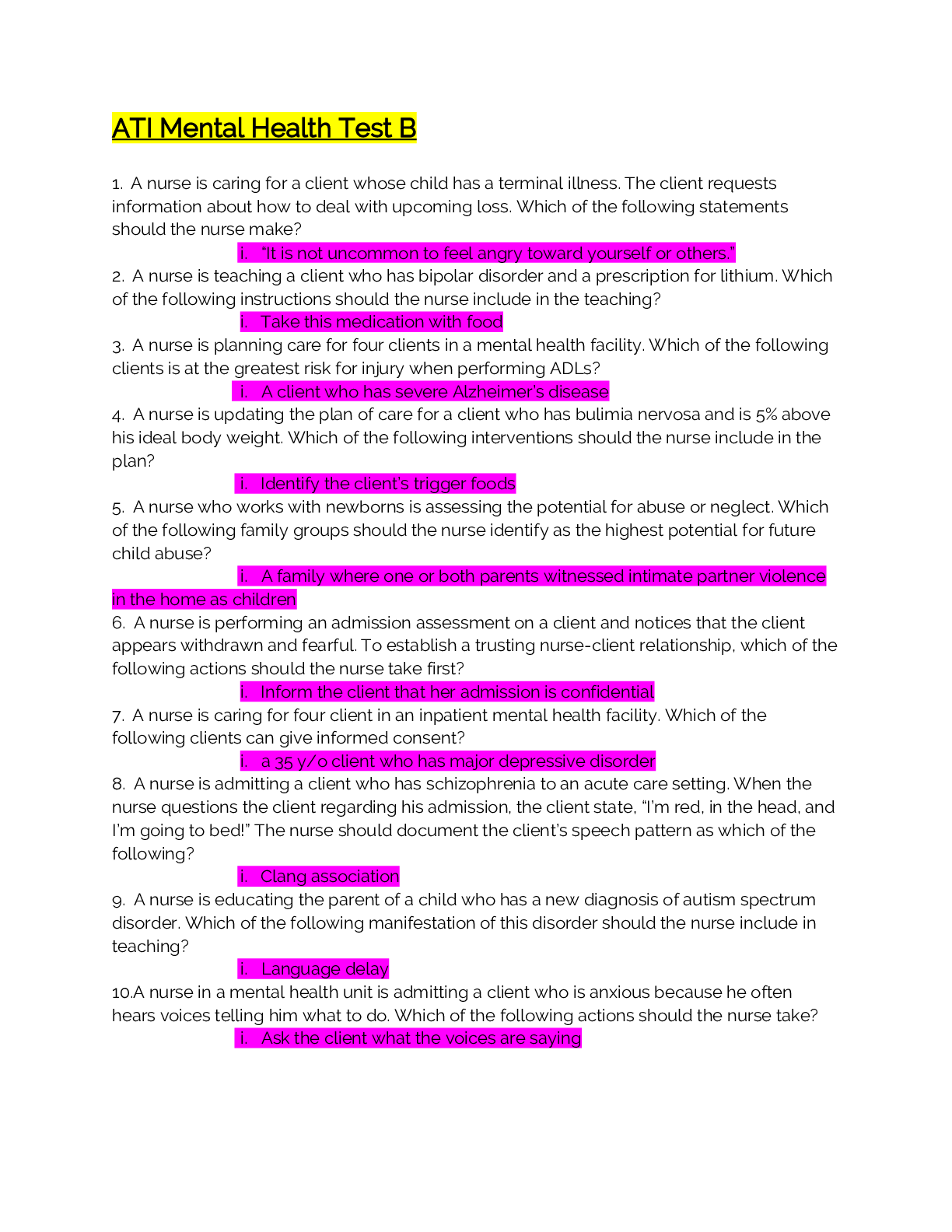Emergency Medicine > QUESTIONS & ANSWERS > EMR Test #1 (Chapters 1-7) Practice Top Questions & Answers, 1005 Accurate, Verified. (All)
EMR Test #1 (Chapters 1-7) Practice Top Questions & Answers, 1005 Accurate, Verified.
Document Content and Description Below
EMR Test #1 (Chapters 1-7) Practice Top Questions & Answers, 1005 Accurate, Verified. Which of the following MOST accurately describes an emergency medical responder (EMR)? A. An individual who ... provides initial advanced life support B. An individual who responds to the scene in an ambulance C. The first medically trained person to arrive at the scene D. A fire fighter or police officer who assists the paramedics - ✔✔-C. The first medically trained person to arrive at the scene Fire fighters and law enforcement personnel are likely to be the first EMRs to arrive at a scene because: A. they are trained in all aspects of an emergency call. B. they are typically paid and are on call 24 hours a day. C. most communities do not have EMTs or paramedics. D. of their location or speed in responding to the call. - ✔✔-D. of their location or speed in responding to the call. A cardiac arrest patient's most crucial contact with the EMS system occurs when: A. trained EMRs arrive at the patient's side. B. medical control is made aware of the situation. C. paramedics arrive and administer advanced care. D. the receiving hospital is made aware of the situation. - ✔✔-A. trained EMRs arrive at the patient's side. When EMTs or paramedics arrive at the scene of an emergency, the EMR should: A. accompany the patient to the receiving medical facility. B. assume that his or her assistance will no longer be required. C. assist the EMTs in continuing the care that he or she initiated. D. obtain a signature from the EMT who is assuming patient care. - ✔✔-C. assist the EMTs in continuing the care that he or she initiated. Which of the following interventions would the EMR most likely perform at the scene of a cardiac arrest? A. CPR and defibrillation B. Administration of certain medications C. Insertion of an endotracheal tube D. Initiation of an intravenous line - ✔✔-A. CPR and defibrillation Fire units are often a crucial part of the EMS system because they: A. always arrive at the scene before EMTs or paramedics. B. are better trained than EMTs to assist paramedics. C. provide specialized rescue such as patient extrication. D. provide protection and control of the scene. - ✔✔-C. provide specialized rescue such as patient extrication. Which of the following statements regarding transport of a patient to the hospital is correct? A. Patients may require immediate stabilization at the closest hospital and then transfer to another facility. B. Any sick or injured patient should be transported to the closest hospital, regardless of the patient's condition. C. EMRs are legally obligated to accompany the patient in the back of the ambulance to the hospital. D. In most states and EMS systems, EMRs are not authorized to assist the EMT in the back of the ambulance. - ✔✔-A. Patients may require immediate stabilization at the closest hospital and then transfer to another facility. A patient requires rapid transport to the hospital when: A. the patient's condition may deteriorate if he or she is not transported fairly quickly. B. EMS personnel are unable to give the patient adequate life-saving care in the field. C. traffic is extremely heavy and the patient's condition requires treatment by a physician. D. he or she requires care that can be provided only by a physician at the hospital. - ✔✔-B. EMS personnel are unable to give the patient adequate life-saving care in the field. A 33-year-old woman has a possible broken left ankle. She is in significant pain but is conscious and otherwise stable. This patient: A. should be rapidly transported to the closest hospital. B. may deteriorate and requires prompt transport. C. does not require transport to the hospital. D. requires transport but without lights and siren. - ✔✔-D. requires transport but without lights and siren. You are at the scene of a shooting. The patient, who is being cared for by paramedics, is unresponsive and has severe bleeding from his injury. In this case, the EMR's most important function is to: A. factually document the care provided to the patient. B. help keep bystanders away from the patient. C. help the paramedics prepare for rapid transport. D. report observations to law enforcement personnel. - ✔✔-C. help the paramedics prepare for rapid transport. To provide the best possible care for the patient: A. all EMS personnel must function effectively as a team. B. the medical director must be notified during every emergency. C. a paramedic must be present at each and every emergency. D. the patient must receive rapid transport to the closest hospital. - ✔✔-A. all EMS personnel must function effectively as a team. Skills commonly performed by the EMR include all of the following, except: A. intravenous therapy. B. splinting fractures. C. hemorrhage control. D. treating shock. - ✔✔-A. intravenous therapy. The EMR must possess the ability to: A. sustain a patient's life for several hours. B. avoid improvisation whenever possible. C. function at the same level as an EMT. D. treat patients using limited equipment. - ✔✔-D. treat patients using limited equipment. Which of the following pieces of equipment should be included in the EMR's life support kit? A. Manual defibrillator B. Endotracheal tubes C. Mechanical suction device D. Mouth-to-mask ventilation device - ✔✔-D. Mouth-to-mask ventilation device Components of the quality improvement process, as identified by the Institute of Medicine, include all of the following, except: A. safety. B. timeliness. C. efficiency. D. teamwork. - ✔✔-D. teamwork. Which of the following statements regarding stress is correct? A. Past experiences may make it difficult to deal with stress. B. Mass-casualty incidents typically produce low stress levels. C. Most emergency calls produce only a minor level of stress. D. Very young patients tend to cause the least amount of stress. - ✔✔-A. Past experiences may make it difficult to deal with stress. Ways in which the EMR can prevent and reduce unnecessary stress include all of the following, except: A. frequent exposure to stress-causing situations to train the mind. B. being aware of the resources and services that are available. C. adjustments in lifestyle to include stress-reducing activities. D. learning to recognize the signs and symptoms of stress. - ✔✔-A. frequent exposure to stress-causing situations to train the mind. Which of the following would most likely produce the greatest amount of stress for the EMR? A. Death B. Anger C. Exercise D. Depression - ✔✔-A. Death All of the following are part of the normal grieving process, except: A. violence B. anger C. depression D. acceptance - ✔✔-A. violence To see his grandson graduate from high school, a man with a terminal illness promises to keep all of his doctor's appointments and take all of his medications exactly as prescribed. This is an example of: A. bargaining B. acceptance C. denial D. anger - ✔✔-A. bargaining Which of the following statements regarding the acceptance stage of the grieving process is correct? A. The patient understands that the situation cannot be changed. B. The patient is satisfied with the situation during this phase. C. Acceptance is typically the first stage of the grieving process. D. It is often characterized by sadness, despair, and denial. - ✔✔-A. The patient understands that the situation cannot be changed. When you encounter a patient with a significant illness, it is important to remember that he or she: A. may be experiencing any stage of grief. B. is usually depressed and will not talk. C. ill always project anger toward you. D. has probably already accepted the situation. - ✔✔-A. may be experiencing any stage of grief. An important step in managing your own stress is the ability to: A. recognize its signs and symptoms. B. ignore its signs and symptoms. C. eliminate all stressors in your life. D. project the stress toward others. - ✔✔-A. recognize its signs and symptoms. If you are experiencing stress away from your job, you should: A. seek assistance from a mental health professional. B. spend some time away from family and friends. C. obtain a prescription for anti-anxiety medication. D. find another job not related to emergency medicine. - ✔✔-A. seek [Show More]
Last updated: 1 year ago
Preview 1 out of 29 pages

Buy this document to get the full access instantly
Instant Download Access after purchase
Add to cartInstant download
We Accept:

Reviews( 0 )
$12.00
Document information
Connected school, study & course
About the document
Uploaded On
Mar 16, 2023
Number of pages
29
Written in
Additional information
This document has been written for:
Uploaded
Mar 16, 2023
Downloads
0
Views
80

